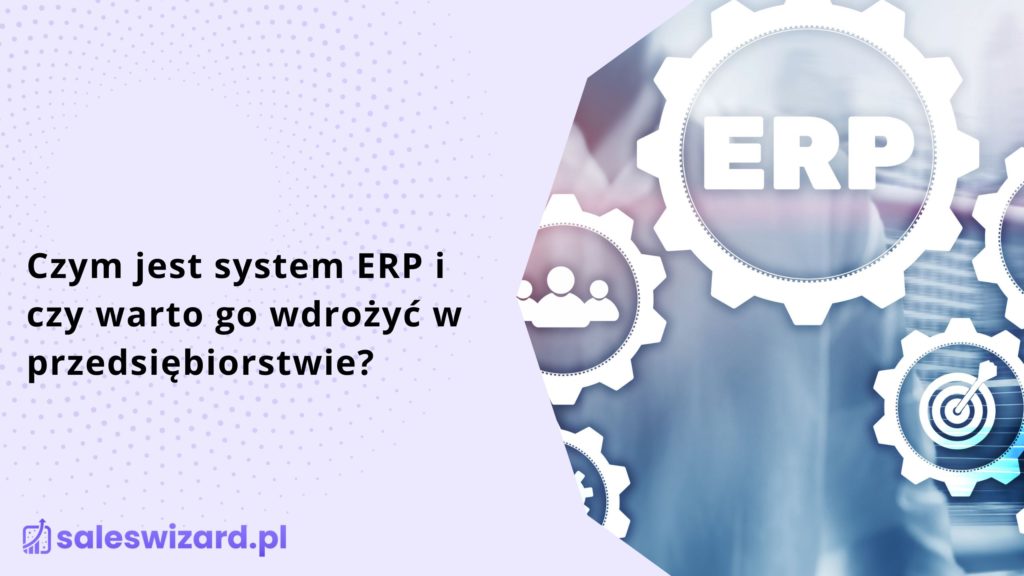What is an ERP system and is it worth implementing in a company?

ERP (enterprise resource planning) is a computerized enterprise resource planning system. It is intended to help manage the entire enterprise, streamline company processes, improve information flow and reduce costs. The key of the ERP system is the common database used by both employees and management.
When choosing an ERP system, it is also worth paying attention to its usability and intuitiveness. The system is mainly used by employees, so the system must be user-friendly for them. Any errors resulting from problems with the use of the system will translate into work results (reports, analysis).
ERP systems in most cases have a modular structure, which means that each company can choose the modules it needs and add more as it grows. Such flexibility in the choice of modules means that the system can be perfectly tailored to the operating profile of a given company. These modules are interconnected and allow for efficient management of the entire company.
The ERP system is a database of modules:
- finance and accounting
- retail and e-commerce
- supplies
- warehouse processes
- HR department
- production
- fixed asset management
- transportation
The ERP system allows you to:
- process automation
- efficient communication between departments but also between branches of the company
- matters of documentation circulation
- creating reports and analyzing data
- budget planning
Pros of using an ERP system in a company
Nowadays, where the development of the IT industry is at a very high level, service companies are using modern IT solutions to improve the operation of their own business. More and more companies are choosing to implement ERP systems. With so much competition in the market, it is worth implementing modern solutions in the company to compete with other companies and to provide employees with modern work tools.
Why should you implement an ERP system in your company?
- A common, unified database for the entire enterprise – data entered in the production department, for example, is available in real time to other departments, such as the procurement department. The complete database also allows the generation of reports that are helpful in managing and planning future activities.
- Saving employees’ time – automation of the company’s processes allows to reduce their duration. As a result, employees’ working time can be fully devoted to effective activities to further develop the company.
- Reduced costs by automating processes and eliminating unnecessary activities. In addition, better, more accurate planning of production, for example, will significantly reduce inventory or storage costs.
- Better circulation of documents within the company between departments. In addition, most documents are stored electronically, which saves money (no use of paper, envelopes, folders, no postage costs) and space.
- Greater control over inventory, purchasing or the production process. More efficient production scheduling, smaller inventories and timely purchases translate into real profit for the company.
- ERP system supports remote work – during the coronavirus pandemic, many companies switched to remote work. An office worker in many cases in his own home can easily perform his duties thanks to access to a system with the full database needed for his work.
For which industries are ERP systems targeted?
ERP information systems are designed to manage a company’s resources more effectively, efficiently and in a more modern way. Thus, it can be said that the system is designed for every industry, because every industry can improve its internal operations thanks to the ERP system. ERP implementation can provide an edge in the market for both commercial, manufacturing, transportation and service companies.
As a rule, such solutions are used by larger companies with a minimum of several departments. ERP systems are the most commonly implemented in the industry:
- transport
- manufacturing
- food
- construction and installation
- healthcare
Differences and similarities between CRM and ERP systems
We already know that ERP is an information system that supports and empowers the management of enterprise resources. CRM, on the other hand, is a system that allows customer relationship management, which is a tool that facilitates the company’s sales goals. Both systems can improve business operations and allow the company to manage its processes. However, each of these systems meets different needs of the company.
CRM systems are smaller in scope and focus on customer contact management and the process of selling a product or service. ERP systems focus more on the company itself than on the customer. Their goal is to help manage all the company’s departments and the warehouse, production, transportation, accounting, sales and financial processes taking place in them. Thus, it can be said that CRM helps increase profits by increasing sales and ERP helps reduce costs by automating processes and managing the company more efficiently.
CRM and ERP systems can be implemented separately depending on the needs of the company, but of course, both can complement each other and further improve the company’s operations. When fighting for a better market position, more sales, reduced costs or more efficient management, it is worth implementing both of these IT systems in the company.
If a company does not want, or cannot afford, to implement both systems, it should choose the one that will be more helpful at the current stage of its business. Companies that focus on selling products or services and want to gain more customers should invest in a CRM system. Such an action will allow development and increase the scope of operations. On the other hand, companies that have several departments and perform both production, sales and transportation of products and want to improve the management of these processes should invest in an ERP implementation. This saves the company both time and money, and the resources saved can be allocated to more effective activities to support growth.
